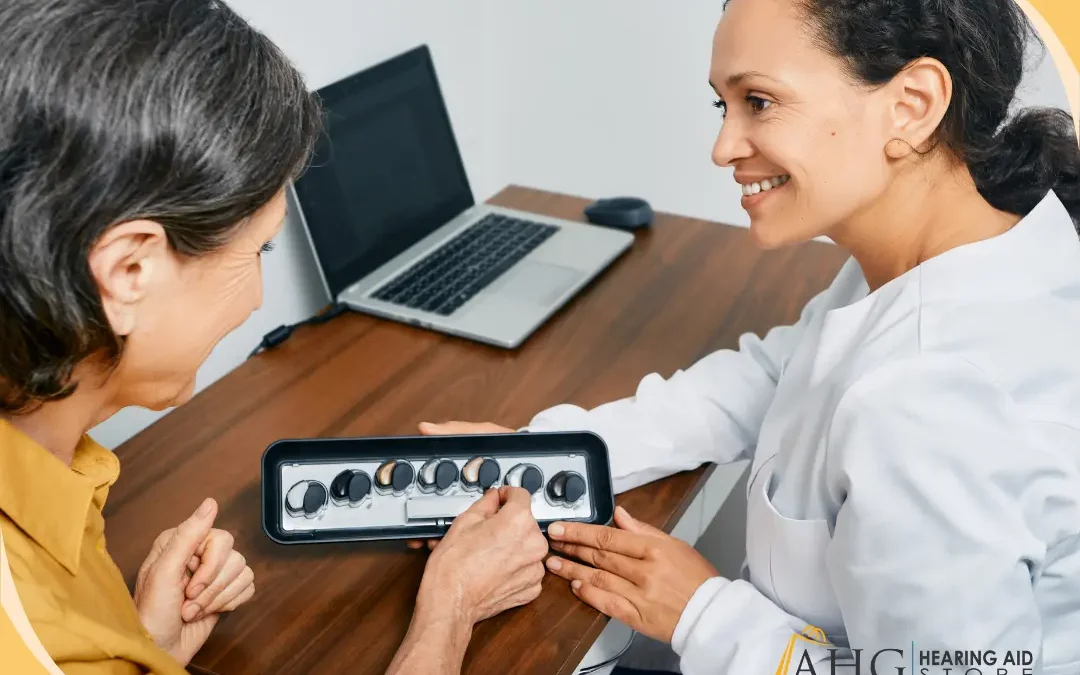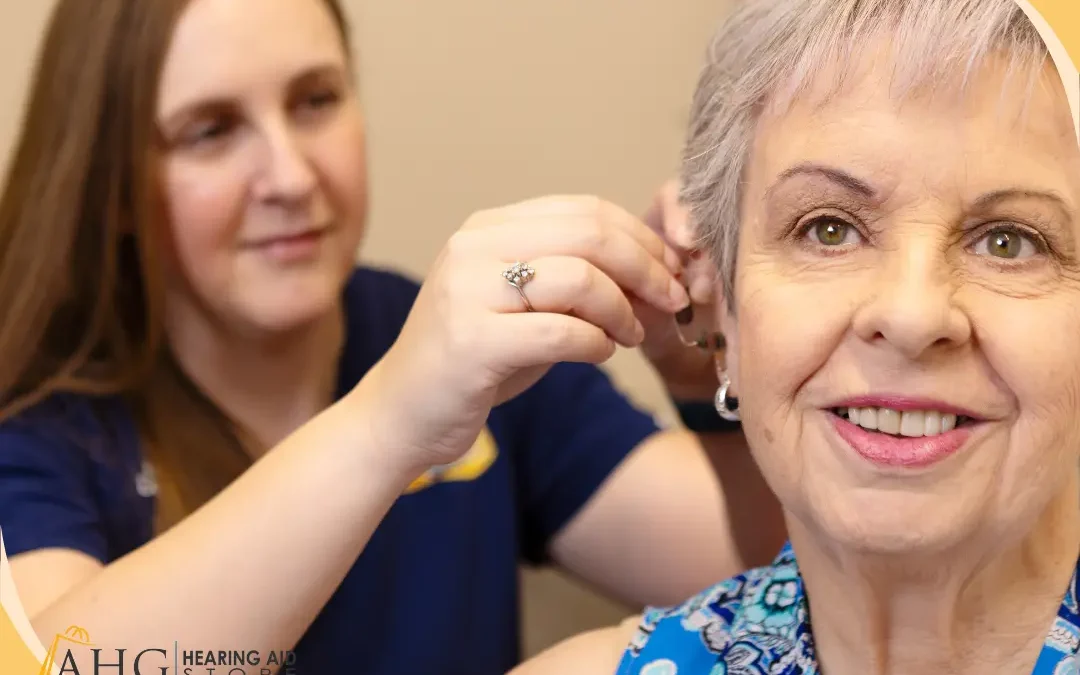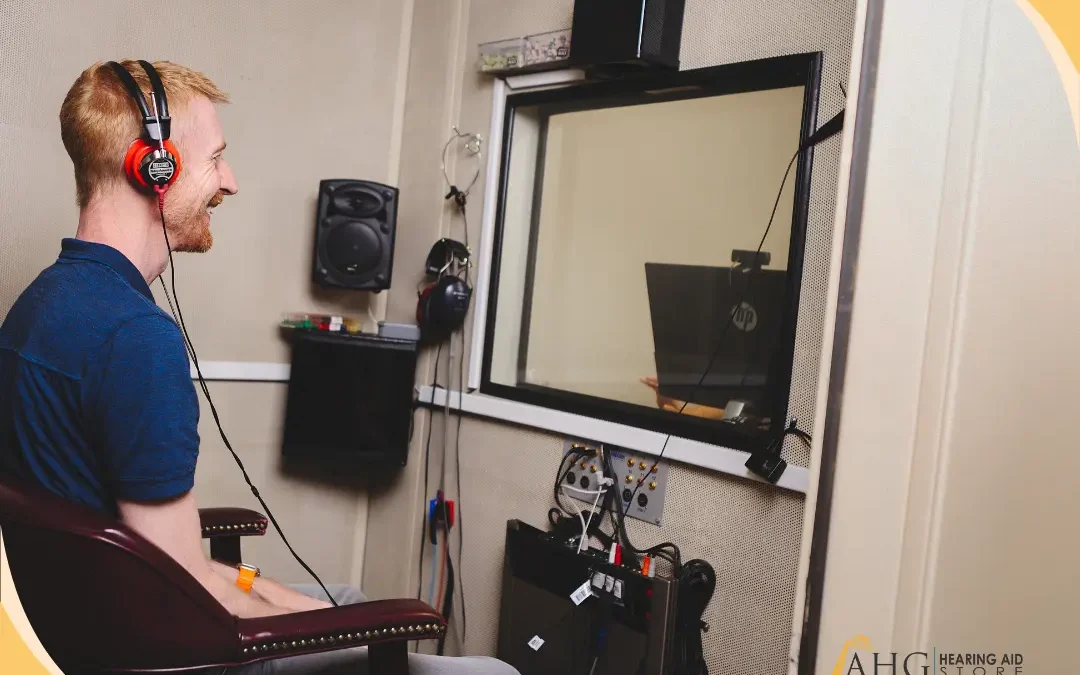
If you’ve noticed hearing changes, like struggling to follow conversations, turning up the TV volume, or dealing with persistent ringing in your ears, you might be considering hearing aids. But with options like over-the-counter (OTC) devices or working with hearing aid specialists, do you need to go to an audiologist for hearing aids?
The answer lies in choosing a professional with the expertise to address your unique hearing needs. For most people, that IS an audiologist. At Advanced Hearing Group, our audiologists in Mesa and Scottsdale offer unmatched experience and comprehensive care to ensure you get the right hearing aids and ongoing support.
Here, we’ll explore why going to an audiologist for hearing aids is usually better than OTC options or working with a hearing aid specialist. Then, we’ll walk you through how our team of hearing professionals can help you hear well and live well.
Understanding the Pitfalls of Over-the-Counter (OTC) Hearing Aids
OTC hearing aids have become more accessible in recent years, marketed as a convenient and affordable solution for mild to moderate hearing loss. While they may seem appealing, they come with significant limitations that can compromise your hearing health and overall experience.
1. Lack of Personalized Assessment
OTC hearing aids are designed as a one-size-fits-all solution, but hearing loss is highly individual. Without a thorough evaluation by a trained professional, you may choose a device that doesn’t address your specific type or degree of hearing loss. This can lead to ineffective amplification, discomfort, or even worsening of your hearing issues over time.
2. No Professional Hearing Aid Fitting or Customization
Hearing aids need to be carefully programmed and fitted to match your hearing profile, lifestyle, and preferences. OTC devices often lack the advanced technology and customization options available through an audiologist, resulting in poor sound quality. Or, they may exhibit inadequate performance in noisy environments like restaurants or family gatherings.
3. Limited Support for Hearing Aid Maintenance and Adjustments
OTC hearing aids typically come with minimal support. If your device malfunctions, needs adjustments, or requires maintenance, you’re often left to troubleshoot on your own or purchase a replacement. This can lead to frustration and additional costs, negating any initial savings.
4. Risk of Misdiagnosis for Hearing-Related Issues
Hearing loss can stem from various causes, some of which require medical attention (e.g., ear infections, wax buildup, or more serious conditions). OTC devices don’t involve a diagnostic evaluation, so you might miss underlying issues that an audiologist would identify and address.
5. Not Suitable for Complex Hearing Loss Cases
OTC hearing aids are only approved for mild to moderate hearing loss in adults. If you have severe hearing loss, tinnitus, or related issues like dizziness, these devices won’t provide the comprehensive care you need.
Choosing OTC hearing aids might seem like a quick fix. Without professional guidance, however, you risk suboptimal outcomes and missed opportunities to address your hearing health holistically.
Related article: OTC vs. Prescription Hearing Aids: A Complete Buyer’s Guide
Why Visiting a Hearing Aid Specialist Might Not Be the Best Way to Get the Hearing Aids You Need
Hearing aid specialists, also known as hearing instrument specialists, are trained to fit and sell hearing aids. However, their scope of practice is narrower than that of an audiologist. While they can be helpful for some, here’s why they may fall short compared to going to an audiologist for hearing aids:
- Limited Diagnostic Expertise – Hearing aid specialists focus primarily on fitting and dispensing hearing aids. However, they lack the advanced training to diagnose complex hearing or balance disorders. If your hearing loss is linked to an underlying medical condition, a specialist may not have the expertise to identify or address it.
- Less Comprehensive Care – Specialists are not trained to provide the full range of audiological services, such as tinnitus management, auditory rehabilitation, or treatment for dizziness. If your needs extend beyond basic hearing aid fitting, you’ll likely need to see an audiologist anyway.
- Fewer Qualifications – Hearing aid specialists typically have less formal education than audiologists. In many states, they require only a high school diploma and specific training or certification. In contrast, audiologists hold advanced degrees and have extensive clinical experience.
For straightforward cases, a hearing aid specialist might suffice, but for personalized, long-term care, an audiologist offers a higher level of expertise and support.
The Benefits of Going to an Audiologist for Hearing Aids
Audiologists are highly trained professionals with a doctoral degree (Au.D.) or master’s degree in audiology, along with extensive clinical experience. Their comprehensive education and expertise make them the gold standard for diagnosing and treating hearing-related issues, including fitting and maintaining hearing aids.
Here’s why choosing an audiologist at Advanced Hearing Group is the best choice:
1. Audiologists Provide Expert Diagnoses and Comprehensive Hearing Evaluations
Audiologists conduct thorough hearing tests to assess the type, degree, and cause of your hearing loss. This ensures your hearing aids are tailored to your specific needs, whether you’re dealing with age-related hearing loss, tinnitus, or balance issues.
At Advanced Hearing Group, our evaluations are detailed and patient-centered, giving you a clear understanding of your hearing health.
2. Audiologists Offer Personalized Hearing Aid Selection and Fitting
Audiologists use advanced technology to program hearing aids to your unique hearing profile. They consider your lifestyle to recommend devices with the right features, such as noise reduction, directional microphones, or Bluetooth connectivity. This customization ensures optimal performance and comfort.
3. Audiologists Can Provide Ongoing Hearing Aid Support, Maintenance, and Adjustments
Hearing aids require regular maintenance, cleaning, and occasional adjustments to maintain peak performance. Audiologists provide hands-on support, including repairs, reprogramming, and routine check-ups.
At Advanced Hearing Group, we’re committed to being your long-term partner, ensuring your hearing aids continue to meet your needs as your hearing or lifestyle changes.
4. Audiologists Provide Holistic Care for Complex Hearing Issues
Beyond hearing aids, audiologists can address related conditions like tinnitus, balance disorders, or auditory processing issues. If your hearing loss is part of a broader medical concern, our audiologists work closely with your referring physician to coordinate care.
5. Get Fast and Accessible Care for Your Hearing Needs
At Advanced Hearing Group, we prioritize quick access, scheduling appointments within two weeks of a referral and offering emergency slots for urgent cases like sudden hearing loss. Our prompt outreach (within two business days) and seamless communication with your doctor ensure you get timely, coordinated care.
6. Audiologists Provide a Patient-Centered Approach
Our audiologists create a welcoming environment, encouraging you to bring a family member for support during appointments. After your visit, we provide a detailed report to your doctor, including test results and a clear plan for next steps, ensuring everyone is aligned on your care.
Take the First Step Toward Better Hearing: Go to an Audiologist for Hearing Aids Today!
Your hearing health is too important to trust to one-size-fits-all solutions or limited expertise. Going to an audiologist for your hearing aids ensures you receive personalized, expert care that addresses your unique needs and enhances your quality of life.
At Advanced Hearing Group, our Mesa and Scottsdale audiologists are dedicated to helping you hear well and live well. That’s why we offer comprehensive hearing evaluations, customized hearing aid fittings, and ongoing support you can rely on.
Don’t wait to address your hearing concerns—act now to experience the difference an audiologist can make! If you’re considering hearing aids, ask your doctor for a referral to Advanced Hearing Group or contact us directly to schedule your appointment. Let’s work together to bring clarity and confidence back to your conversations and daily life!





